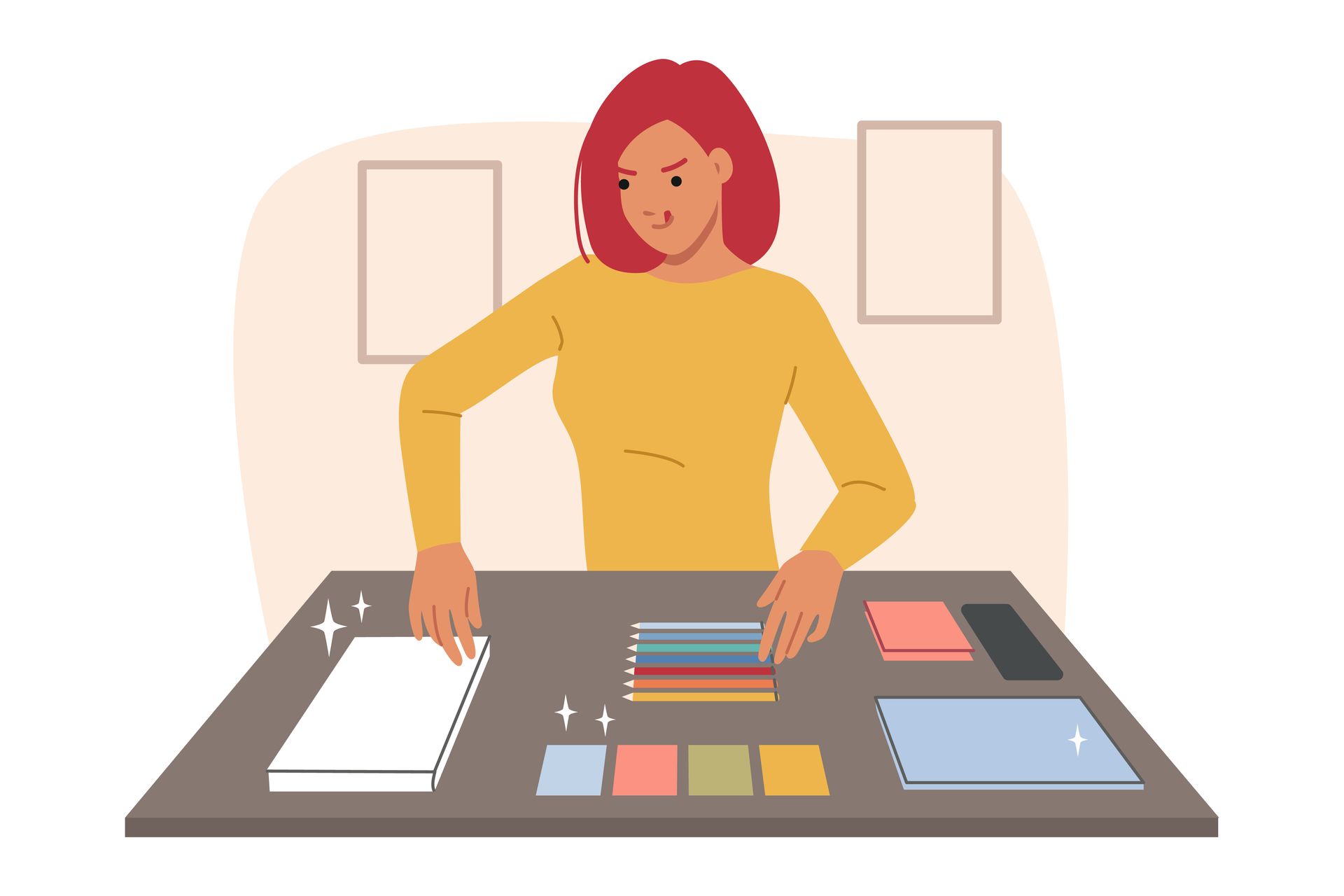OCD Treatment at Modern Psychiatry
Breaking Free from the OCD Cycle
If you're struggling with OCD, you already know it's nothing like what you see in movies or TV shows. It's not about being "neat" or "organized." OCD is having thoughts that won't leave you alone, paired with behaviors you feel you absolutely must do, even when you know they don't make logical sense. It's exhausting, frustrating, and can take over your entire life if left untreated.
At
Modern Psychiatry, we understand that OCD isn't a quirk or a personality trait – it's a real mental health condition that responds well to the right treatment. You don't have to live trapped by obsessive thoughts and compulsive behaviors. We're here to help you break free from the cycle and reclaim your life.
Understanding What OCD Really Is
OCD has two key parts that work together: obsessions and compulsions. Obsessions are those unwanted thoughts, mental pictures, or impulses that barge into your head uninvited and create real anxiety or upset. These aren't your typical day-to-day concerns - they're the kind of thoughts that feel pressing and scary, even though part of you recognizes they don't make much sense.
Common obsessions include fears about contamination or germs, worries about harming yourself or others, concerns about things being "just right" or symmetrical, religious or moral worries, or disturbing sexual or violent thoughts that go against your values.
Compulsions are the behaviors or mental acts you feel driven to perform in response to obsessions. These might include excessive washing or cleaning, checking things repeatedly, counting or repeating certain words, arranging objects in specific ways, or seeking reassurance from others.
The tricky thing about OCD is that performing compulsions usually provides temporary relief from the anxiety caused by obsessions. But this relief is short-lived, and the cycle starts all over again, often getting stronger each time.
Common Types of OCD
OCD shows up differently for different people, but there are some common patterns. Contamination OCD involves fears about germs, dirt, or illness, leading to excessive washing, cleaning, or avoidance of "contaminated" objects or places.
- Harm OCD involves intrusive thoughts about hurting yourself or others, even though you would never actually want to do these things. This might lead to avoiding sharp objects, constantly checking that doors are locked, or seeking reassurance that you haven't hurt anyone.
- Pure-O OCD, short for Purely Obsessional OCD, is a form of Obsessive Compulsive Disorder that doesn’t show up in the way most people expect.
Instead of doing things like checking locks or washing hands over and over, people with Pure-O struggle with upsetting thoughts that keep coming into their minds. To try to feel better, they often repeat mental habits like silently saying certain words or reviewing past events in their head. These rituals aren’t visible to others, which can make this type of OCD harder to recognize.
- Symmetry and ordering OCD involves needing things to be "just right," perfectly arranged, or symmetrical. This might mean spending hours arranging objects, rewriting notes until they look perfect, or feeling extremely uncomfortable when things are out of place.
- Religious or moral OCD (sometimes called scrupulosity) involves excessive worry about sin, morality, or religious correctness. This might lead to excessive praying, confessing, or avoiding situations that might be "morally wrong."
Many people have a combination of different OCD themes, and symptoms can change over time.
How We Treat OCD
What's encouraging about OCD is that it responds really well to treatment. Particular therapies and medications have shown strong results for managing OCD symptoms.
Exposure and Response Prevention (ERP) is widely recognized by experts as highly effective for OCD treatment. This approach involves gradually facing triggers while resisting compulsive behaviors, helping the brain learn that obsessions and compulsions don't need to be connected.
CBT is another excellent approach that works well for OCD. With this method, you learn to spot and question the thinking patterns that keep your OCD going strong. You'll get better at seeing OCD thoughts for what they really are - just random brain activity, not urgent messages you have to act on. CBT techniques can help you develop practical strategies for managing symptoms and breaking the cycle of obsessive thoughts and compulsive behaviors.
Some medications can make a real difference, especially the SSRI family of antidepressants. For OCD, doctors usually prescribe these at stronger doses than they would for depression, and it typically takes a month or more before you notice changes.
What Treatment Actually Looks Like
Starting OCD treatment can feel overwhelming, especially if your symptoms have been controlling your life for a while. We start slowly and build up gradually. You'll never be thrown into situations that feel completely impossible to handle.
During your first appointment, we'll talk about your specific obsessions and compulsions, how they're affecting your daily life, and what your goals are for treatment. We'll work together to create a hierarchy of situations that trigger your OCD, starting with easier challenges and working up to more difficult ones.
For example, if you have contamination OCD, we might start with touching a doorknob for five seconds without immediately washing your hands, then gradually work up to more challenging exposures. The key is going at a pace that feels challenging but manageable.
Throughout treatment, we'll help you develop coping strategies for managing anxiety and dealing with intrusive thoughts. You'll learn that you can handle the discomfort of not performing compulsions, and that the anxiety will decrease on its own if you give it time.
Supporting Your Recovery
Recovery from OCD is definitely possible, but it takes commitment and practice. The skills you learn in treatment need to be used consistently in your daily life. This means continuing to resist compulsions even when you're stressed or anxious about other things.
Family members and friends can play an important role in recovery, but they need to understand how to help in the right way. Sometimes loved ones accidentally enable OCD by providing reassurance or helping with compulsions. We can provide guidance on how your support system can best help your recovery.
It's also important to be patient with yourself. OCD recovery isn't always a straight line – you might have setbacks or challenging days. This is completely normal and doesn't mean you're not making progress.
Convenient Care Options
We know that OCD can make it difficult to leave the house or travel to appointments, especially if you have contamination fears or specific routines that are hard to break. That's why we offer both in-person and telehealth options.
If we have a physical location in your state, you can choose between meeting in person or having virtual appointments. For states where we don't have offices, we provide comprehensive OCD treatment through secure telehealth platforms.
Many people with OCD actually find telehealth appointments less stressful because they can participate from their own space without worrying about contamination or disrupting their routines to travel.
Moving Forward
If you think you might have OCD, getting proper treatment is the best thing you can do for yourself. OCD tends to get worse over time without treatment, but it responds very well to the right interventions.
At Modern Psychiatry, we have extensive experience treating OCD and understand the unique challenges it presents. We'll work with you to develop a treatment plan that fits your specific symptoms and lifestyle.
Frequently Asked Questions
How do I know if I have OCD or if I'm just a perfectionist?
OCD involves intrusive thoughts that cause significant distress, along with compulsive behaviors that you feel you must perform to reduce anxiety. Perfectionism might involve high standards, but it doesn't usually include the obsessive thoughts and compulsive behaviors that characterize OCD. If your thoughts and behaviors are taking up significant time each day or interfering with your life, it's worth getting evaluated.
What if my OCD thoughts are really disturbing or violent?
Having disturbing thoughts doesn't mean you're a bad person or that you want to act on them. In fact, the fact that these thoughts disturb you is evidence that they don't reflect your true values. These types of intrusive thoughts are actually quite common in OCD, and they respond well to treatment.
How long does OCD treatment take?
This varies depending on the severity of symptoms and how long you've had OCD. Many people start seeing improvement within a few months of starting treatment. The skills you learn in therapy are tools you can use for life to manage symptoms.
Can OCD come back after treatment?
Some people do experience symptom recurrence, especially during times of stress. However, once you've learned ERP skills, you have tools to address symptoms if they return. Many people find that even if symptoms come back, they're much more manageable than before treatment.
Ready to Break Free From OCD?
Contact Modern Psychiatry today to start your journey toward freedom from obsessive thoughts and compulsive behaviors.




